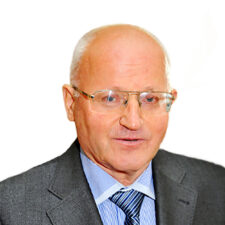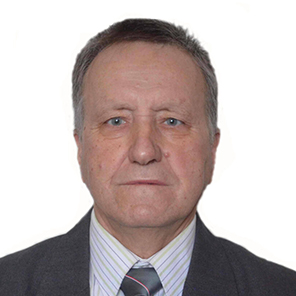
Head of Laboratory
PhD in Agricultural Sciences, Senior Researcher
Coordinator for International Cooperation
PhD in Agricultural Sciences, Senior Researcher
Coordinator for International Cooperation
Zakharova Maryna Anatolyivna
+38(067)575-91-25Scientific supervisor

Doctor of Agricultural Sciences, Professor, Academician of the National Academy of Agrarian Sciences
Baliuk Sviatoslav Antonovych
+38(057)704-16-92Leading scientists

Chief Research Fellow
Doctor of Agricultural Sciences, Professor, Corresponding Member of National Academy of Agrarian Sciences
Doctor of Agricultural Sciences, Professor, Corresponding Member of National Academy of Agrarian Sciences
Truskavetskyi Roman Stepanovych
+38(099)252-72-71
Leading Research Fellow
Doctor of Biological Sciences, Senior Researcher
Doctor of Biological Sciences, Senior Researcher
Tsapko Yury Leonidovych
+38(099)914-08-81
Leading Research Fellow
Doctor of Agricultural Sciences, Senior Researcher
Doctor of Agricultural Sciences, Senior Researcher
Vorotyntseva Lyudmila Ivanivna
+38(050) 278-33-62, +38(057) 704-16-69,
Senior Research Fellow
PhD in Agricultural Sciences
PhD in Agricultural Sciences
Zubkovska Viktoriya Viktorivna
+38(050)140-37-73
Senior Research Fellow
PhD in Agricultural Sciences
Coordinator for International Cooperation
PhD in Agricultural Sciences
Coordinator for International Cooperation
Khyzhnyak Iryna Mykolaivna
+38(066)944-99-55Main areas of activity
- Assessment of the modern ecological and agro-remedial state of irrigated, withdrawn from irrigation and saline soils in different soil and climatic zones of Ukraine with the creation of databases and cartographic materials.
- Study of the influence of various methods, regimes of irrigation, land reclamation and cultivation on the transformation of physico-chemical properties, soil processes and regimes of irrigated, removed from irrigation and saline soils, directions of their evolution; creation of predictive models of their development and fertility; establishment of regional development features.
- Development of landscape-adapted measures, focused on modern features of land use, to protect and regulate the fertility of irrigated, removed from irrigation, and alkaline lands.
- Creation of a regulatory and methodological base for agro-ecological land monitoring to prevent the development of degradation processes.
- Problems of anthropogenic evolution, monitoring, agroecology and protection of hydromorphic (overmoistened), acidic and drained soils; development of the fundamental foundations of preserving their optimal productive capacity in the conditions of growing external and internal loads, including the degradation of these soils as a result of military actions.
- Theoretical and practical aspects of the study of the buffering capacity of soils, the regularities of the functioning of their buffering mechanisms in the sense of acquisition by soils of a stable ability to resist negative natural and anthropogenic influences.
- Scientific substantiation of the rational use and protection of peat soils and determination of their suitability for growing agricultural products.
- Development of the methodology and implementation of the evaluation of the ecological and reclamation state of the drained soils and establishing the feasibility of their further use for the targeted purpose.
- Scientific support and provision of practical recommendations for growing energy crops (energy willow and giant miscanthus).
The most important research results
- Patterns of modern soil evolution due to irrigation, land reclamation and removal from irrigation.
- Soil-ecological aspects of restoration and development of irrigation for the purpose of adaptation to climate change.
- System of criteria and indicators of soil quality and water quality for irrigation: assessment methodology and improvement technologies.
- Survey and assessment methodology and measures to improve the ecological and agromelioration condition of irrigated lands and adaptive regulation of their fertility.
- Concept of innovative development of chemical land reclamation and modern measures and technologies of reclamation of natural saline and secondary saline soils of Ukraine.
- Resource-saving technologies of amelioration and management of the fertility of acidic soils.
- Methods of determining the buffering capacity of soils: acid-base, potassium, phosphate.
- Methods of potentiometric measurement of soil physical and chemical parameters, in situ, content of individual ions, pH and Eh.
- A system of criteria and methods for diagnosing and forecasting the agroecological state of hydromorphic and acidic soils.
- System of evaluation indicators of agro-ecological stability of acidic soils.
- Methods of determining doses of limestone, phosphorite and potash meliorants.
Main achievements in international activities
- implementation of the project on monitoring irrigated and drained lands within the framework of the USAID Program for Agricultural and Rural Development (AGRO)
- participation in the creation of a digital network map of saline soils of Ukraine, as a component of the FAO Global Map - GSSmap (2021)
- participation in the creation of an interactive network Global Map of Saline Soils (GSSmap) (2020-2021);
- implementation of the international Ukrainian-Moldovan research project "Agrogeochemical patterns of migration and accumulation of heavy metals in irrigated alluvial soils of the Dniester and Dnieper floodplains" (2017-2018);
- participation in the creation of a digital network map of organic carbon stocks in the soils of Ukraine, as a component of the FAO Global Map - GSOCMap (2017);
- organization and holding of a training-seminar on the management of saline soils for the countries of the Eurasian Soil Partnership (2017), on behalf of FAO;
- implementation of the international project on behalf of FAO: "Evaluation of ecosystem services of saline soils under the influence of land reclamation (2016-2017);
As a result of the implementation of the projects the following was developed:
- methodology for assessing the ecosystem services of saline soils, cartograms of key indicators of the ecological and reclamation state of lands, and zoning of pilot territories according to reclamation technologies.
- approaches to ecological standardization of the content of chemical elements in environmental objects in order to develop optimal solutions regarding the ways of further use of irrigated alluvial soils.
- digital network maps of organic carbon reserves in the soils of Ukraine (as a component of the FAO GSOCMap, 2017) and of saline soils of Ukraine (as a component of the FAO GSSmap, 2021).
- proposals to improve the legislation of Ukraine and implement innovative methods of monitoring irrigated and drained lands using modern GIS technologies and remote sensing methods.
Specialists of the Laboratory are participants in numerous international internships, trainings and events on the management of the fertility of irrigated and saline soils.
Sviatoslav Baliuk - Member of the International Commission on Irrigation and Drainage (ICID), International Union of Soil Sciences (IUSS), Global Soil Partnership (FAO), European Soil Partnership (FAO).
Maryna Zakharova - Expert of International Network of Salt-Affected Soils (INSAS FAO). Member of the SAS&Water working group of INSAS.
Lyudmyla Vorotyntseva - Expert of International Network of Salt-Affected Soils (INSAS FAO). Member of the SAS&Water working group of INSAS.






